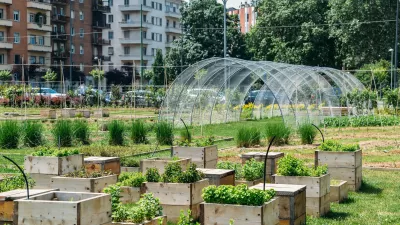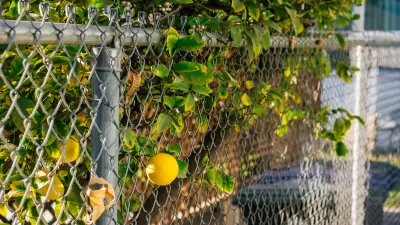It may be one of the worst food deserts in the country, but Detroit has enough open land in the city's 103,000 vacant lots to become self-sufficient in terms of food production, argues Mark Dowie.
Some 80 percent of Detroit residents are presently purchasing their groceries at convenience stores and gas stations. That could soon change; the city's plan to demolish thousands of homes and concentrate the population in viable neighborhoods will leave vast open areas suitable for cultivation. Mark Dowie, author of Losing Ground: American Environmentalism at the Close of the Twentieth Century, suggests that Detroit could actually become a highly sustainable city if this asset were used.
"Were I an aspiring farmer in search of fertile land to buy and plow, I would seriously consider moving to Detroit. There is open land, fertile soil, ample water, willing labor, and a desperate demand for decent food. And there is plenty of community will behind the idea of turning the capital of American industry into an agrarian paradise. In fact, of all the cities in the world, Detroit may be best positioned to become the world's first one hundred percent food self-sufficient city.
An American Institute of Architects panel concludes that all Detroit's residents could fit comfortably in fifty square miles of land. Much of the remaining ninety square miles could be farmed. Were that to happen, and a substantial investment was made in greenhouses, vertical farms, and aquaponic systems, Detroit could be producing protein and fibre 365 days a year and soon become the first and only city in the world to produce close to 100 percent of its food supply within its city limits."
FULL STORY: Food Among the Ruins: Should Detroit Be Converted Into a Farming Mecca?

Planetizen Federal Action Tracker
A weekly monitor of how Trump’s orders and actions are impacting planners and planning in America.

Maui's Vacation Rental Debate Turns Ugly
Verbal attacks, misinformation campaigns and fistfights plague a high-stakes debate to convert thousands of vacation rentals into long-term housing.

San Francisco Suspends Traffic Calming Amidst Record Deaths
Citing “a challenging fiscal landscape,” the city will cease the program on the heels of 42 traffic deaths, including 24 pedestrians.

Amtrak Rolls Out New Orleans to Alabama “Mardi Gras” Train
The new service will operate morning and evening departures between Mobile and New Orleans.

The Subversive Car-Free Guide to Trump's Great American Road Trip
Car-free ways to access Chicagoland’s best tourist attractions.

San Antonio and Austin are Fusing Into one Massive Megaregion
The region spanning the two central Texas cities is growing fast, posing challenges for local infrastructure and water supplies.
Urban Design for Planners 1: Software Tools
This six-course series explores essential urban design concepts using open source software and equips planners with the tools they need to participate fully in the urban design process.
Planning for Universal Design
Learn the tools for implementing Universal Design in planning regulations.
Heyer Gruel & Associates PA
JM Goldson LLC
Custer County Colorado
City of Camden Redevelopment Agency
City of Astoria
Transportation Research & Education Center (TREC) at Portland State University
Jefferson Parish Government
Camden Redevelopment Agency
City of Claremont





























